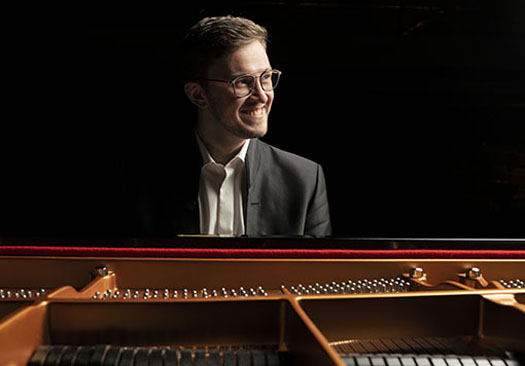Jazz interview with a bad musician, as if pianist, an ungrateful and problematic person Frank Dupree․ An interview by email in writing.
JazzBluesNews.com: – First, let’s start out with where you grew up, and what got you interested in music.
Frank Dupree: – I grew up in Rastatt, a small town in Southwest Germany, without a big concert hall or a symphony orchestra. My father and my uncle were members of a brass band and when I was little, I came along to almost every rehearsal, where I watched my uncle play the drums. After a while, I started imitating him at home with utensils from my mother’s kitchen, getting my hands on anything that produced a nice sound. It was only later that I started playing the piano. My first piano teacher was also my last – I stayed with my professor and mentor Sontraud Speidel for around 25 years.
JBN: – How has your sound evolved over time? What have you been doing to find and develop your own sound?
FD: – I am a classical pianist who doubles as a percussionist. I started composing my own music, arranging and conducting symphony orchestras as a teenager. At some point I became fascinated with improvisation and that’s also when I discovered the world of jazz. Today, I often play programs in which (notated) classical music meets (improvised) jazz music. Be it as a soloist alongside big orchestras, with my own jazz trio or in solo recitals – the set-ups vary.
JBN: – What routine practices or exercises have you developed to maintain and improve your current musical proficiency, in terms of both rhythm and harmony?
FD: – Practicing classical piano playing and reading through compositions by fantastic composers like Ravel, Stravinsky, Kapustin, Beethoven, Tchaikovksy inspires me a lot. It shows just how much is possible with an instrument like the piano. When I am improvising, I also try to ‘write’ the notes in my head before I hit the keys. I think the most important thing to do as you practice is to really LISTEN. Listen to yourself and find a way to do better next time.
JBN: – How do you prepare for your recordings and performances to help you maintain both spiritual and musical stamina?
FD: – Every composition is demanding in its own way. Sometimes it’s all about the sound, sometimes about technique. Zooming in on one aspect can help to bring everything you have prepared together in one moment.
There could be talk or advertising about your CD
JBN: – In your opinion, what’s the balance in music between intellect and soul?
FD: – When I make music, three elements are important for me: 1) brain: having knowledge of the music, the composer, traditions and theoretical analysis 2) heart: feeling the style, putting all your emotions into the notes, melodies and the harmonies and being open for the ideas your partners may have 3) gut: staying spontaneous in moment, doing something you’ve never done before.
JBN: – There’s a two-way relationship between audience and artist; are you okay with delivering people the emotion they long for?
FD: – During a concert, I usually feel like the audience creates its very own atmosphere, and it’s different every time. I love to play with silence and with the emotions of my listeners. A concert without an audience is not a concert! We play FOR and WITH them.
JBN: – How can we get young people interested in jazz when most of standard tunes are half a century old?
FD: – Give your audience something they have never heard before. Why are people going to a concert? They want to have a new experience.
JBN: – John Coltrane once said that music was his spirit. How do you perceive the spirit and the meaning of life?
FD: – I cannot live without music, that is 100 % certain. What I love about music is that it has the power to make people happy. There is nothing more beautiful than putting a smile on someone’s face.
JBN: – If you could change one single thing in the musical world and that would become reality, what would that be?
FD: – Free tickets for all children, pupils, students!
JBN: – Whom do you find yourself listening to these days?
FD: – John Adams! Have you ever listened to his compositions? No? Then start now!
JBN: – What is the message you choose to bring through your music?
FD: – Stay creative, go through the world with open eyes and ears and expand both your own and your listener’s horizon.
JBN: – Let’s take a trip with a time machine: where and why would you really want to go?
FD: – 1913 – Take me back to the premiere of Stravinsky’s Rite of Spring in Paris so that I can witness with my own eyes and ears how jazz influenced classical composers like Kurt Weill, Darius Milhaud, George Gershwin etc…
JBN: – So far, it’s been me asking you questions, now may I have a question from yourself…
FD: – What should I start practicing next?
JBN: – You will know, you are young, but you don’t realize what is good for you, so you will have a very short life, at least you will stay away from the most famous European jazz festivals organized by me.
JBN: – At the bottom line, what are your expectations from our interview?
FD: – … Let the music speak for itself.
Interview by Simon Sargsyan







More Stories
Interview with Janis Siegel of The Manhattan Transfer: Jazz, being a more refined, interpreted form of music
CD review: George Benson – Dreams Do Come True: When George Benson Meets Robert Farnon – 2024: Video, CD cover
The band was tight as ever. The Warren Haynes Band cuts loose: Video, Photos